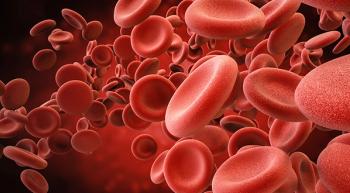
“Nurses are our frontline as far as giving these treatments and also in teaching our patients about side effects and detecting them,” Grace Cherry, NP, MSN, RN said.

“Nurses are our frontline as far as giving these treatments and also in teaching our patients about side effects and detecting them,” Grace Cherry, NP, MSN, RN said.

Patients with breast cancer may be apprehensive to come into the clinic for treatment amidst the coronavirus disease 2019 (COVID-19) pandemic. However, others may prefer seeing their treatment team in person.

As immunotherapy continues to move into different tumor types, nurses must familiarize themselves – and their patients – with immune-related adverse events.

Cervical cancer is often diagnosed in the later stages, though incidence of the disease is declining thanks to the HPV vaccine.

When it comes to immunotherapy-related adverse events, patients with lung cancer tend to have higher rates of pneumonitis than other cancer types, one nurse explains.

In order to achieve health equity for patients with cancer, physicians must first understand the root cause of heath disparities, many of which may be invisible. Broadening conversations about health and equity, drawing attention to gaps in care, and prompting urgency on the issues that influence health care are crucial first steps to turn conversation into action.

Genetic testing is more important now than ever before, as biomarker-driven cancer treatments continue to receive approval across many tumor types. While these personalized treatments are improving outcomes, navigating the landscape of genetic testing can leave patients with questions for their providers.

One of the most important tasks that oncology nurses face is ensuring that patients are taking their medications consistently and correctly, and that adverse events (AEs) are properly managed—specifically in those patients with breast cancer, according to Patricia Jakel, RN, MN, AOCN.

The virtual meeting will cover new therapies, adverse event management, end-of-life care, and much more.

Partial-breast radiation may be more convenient for patients with breast cancer, and according to recent research, the outcomes aren’t much different than patients who had whole-breast radiation.

There are a lot of treatment updates for various malignancies happening seemingly all at once. We had the chance to speak with Laura S. Wood, RN, MSN, OCN, for her take on why these updates are coming so rapidly.

The genitourinary cancer space has seen a lot of updates in the past 5-10 years, but where are they all coming from so suddenly? Oncology Nursing News spoke with Michael Lai, ARNP, a nurse practitioner at Seattle Cancer Care Alliance, about how the genitourinary cancer space has been able to have so many updates recently.

To best help your patients, you need to understand what they are going through, and the best way to do that is to have hopeful conversations with them that get them talking.

At the 3rd Annual School of Nursing Oncology, Oncology Nursing News had the chance to sit down with Madelaine Kuiper, MSN, RN, and talk about what nurses need to understand about the evolving landscape of breast cancer treatment.

Conferences are where oncology nurses can network, discuss key topics in their field, and hear new updates that will eventually affect their patients. At the 3rd Annual School of Oncology Nursing, we had the chance to talk about what nurses can gain from these conferences with Patricia Jakel, MN, RN, AOCN.

Can combining agents turn "cold" prostate cancer tumors "hot"?

Like most other adverse events (AEs), nurses play a vital role in monitoring for and managing endocrine toxicities associated with immunotherapy treatment; however, these may be more unique than others, according to Marianne Davies, DNP, RN, CNS, ACNP-BC, AOCNP.

At the 3rd annual School of Oncology Nursing Laura S. Wood, RN, MSN, OCN, renal cancer research coordinator at the Cleveland Clinic Taussig Cancer Center and one of the co-chairs of the School of Oncology Nursing, presented on supportive care for GU malignancies and we had the chance to discuss the highlights with her.

Nurses should know what to look for when it comes to managing dermatologic toxicities.

Nurses can lead the healthcare team when it comes to managing immune-related GI toxicities.

Nurses must stay up to date with the fast-moving world of bladder cancer.

Treating patients with hematological malignancies has moved beyond just using chemotherapy. And to discuss this change we sat down with Laura J. Zitella, MS, RN, ACNP-BC, AOCN, associate clinical professor at the University of California San Francisco, at the 3rd annual School of Nursing Oncology.

To start, nurses must be able to prevent and anticipate GI toxicities.

Patients experiencing chemotherapy-induced nausea and vomiting (CINV) need to understand what can be done to help their symptoms, and oncology nurses can educate them on what is best to take for CINV.

There are key steps that nurses can follow to improve upon patient expectations and their understanding of end-of-life care.

Nurses must stay up to date on immunotherapy advancements, since they are the frontline communicators with patients.

Nurses must understand CAR T-cell therapy and be able to recognize what to do when encountering patients who have received it.

Nurses and other care providers should not assume that they know what a patient wants when it comes to expectations for their treatment.

Nurses can serve in a variety of roles when it comes to clinical trials – from being a research nurse or a vital piece of the multidisciplinary team, according to Maria Hendricks, MSN, RN.

At the 3rd annual School of Nursing Oncology (SONO) meeting, we got the chance to sit down with Madelaine Kuiper RN, MSN, and talk about what adverse events come with immune therapy for patients with breast cancer.